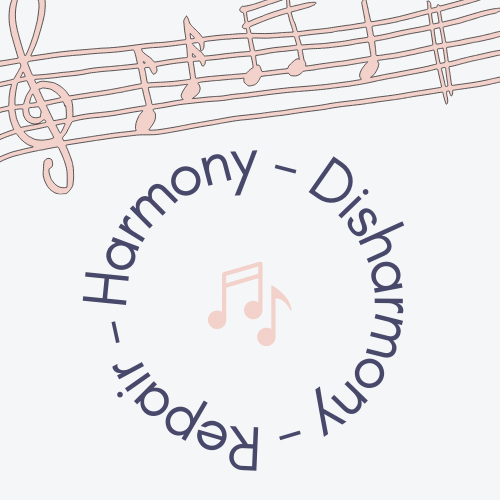Healthy Relational Rhythms include REPAIR
Healthy relational rhythms include REPAIR. For those of us that didn’t learn that when we were growing up, we may have some adaptive patterns that may no longer serve. In this article, we’ll take a look at:
- Harmony-Disharmony-Repair
- Preventing disharmony (not the goal)
- When we don’t know repair is possible (adaptations)
- Learning forward, thriving forward
- References, notes, and more
Harmony- Disharmony – Repair
I didn’t know this until much later in life… healthy relational rhythms flow from harmony to disharmony to repair and back to harmony. Now that I do know this, it makes so much sense, but it was literally in my blind spot until much later in life.

In my family-of-origin, relational rhythms went from harmony, to me over-functioning to ensure harmony was maintained, to if disharmony did happen then figure out how to be an even better good girl next time. The end. No repair process.
Because I didn’t know repair was possible (and I share this in case you can relate), I developed adaptations to try to prevent disharmony. My adaptive patterns included: fixer, helper, produce-for-worth, over-explaining, and…. emotional over-responsibility.
Emotional over-responsibility included making assumptions about how others around me were feeling, and then, trying to diffuse any high temperatures through people-pleasing and being uber-helpful (based on my guess of what was needed).
I didn’t even realize that those behaviors were survival adaptations, I thought I was being “good”.
Then came that bitter-sweet healing moment when I had enough internal safety to be able to see with more clarity that I was being boundary-impaired. (Which is uncomfortable and a little cringy, uggh)
Adaptive Then, Maladaptive Now
When I was young, being boundary-impaired by supporting my adult in processing her big feelings was pretty wise, and I appreciate younger me for coming up with that adaptation. BUT, as an adult, taking over-responsibility for another adult’s big feelings… well, that’s leaky boundaries on my part. It is disempowering to others. Terry Real has a wonderful and compassionate saying for ah-ha moments like these: “Adaptive then, maladaptive now”.
Seeing our adaptations with more clarity is one of the uncomfortable side-effects of growth. The good news: the remothering moments where I was able to turn within to greet myself with an “of course you did that” helped ease the discomfort of realizing what I didn’t know until I did. And, from that place of self-compassion, I was able to keep learning and growing-forward.
If you wrestle with an adaptation, know that you are not alone. Our human brains are wired to survive, so OF COURSE we developed some glitchy programming along the way. And, more good news: neuroplasticity is on our side.
Here’s to us being able to turn within for the nurturance, wise counsel, connection, protection, acceptance, love, and all of the other mother qualities we humans naturally seek. Here’s to the remothering moments. Here’s to thriving forward in self-alignment!!!
Wishing you all the best, today and always.
From my heart to yours,
Simona
References, Notes, and More
Healthy Relational Rhythms
I learned the term “harmony-disharmony-repair” from Terry Real. He has a number of books, plus a training institute where he teaches his methodology of Relational Life Therapy. For more about Terry, you can check out his website here: TerryReal.com
Repair
Ed Tronick’s research points to the repeated repair process (not the absence of disharmony) in building emotional security in our relationships. If you are interested in learning more about his work, you may find it worthwhile to check out this 2 minute video on the Still Face Experiment. BTW: this particular clip doesn’t talk about the repeated repair process, but it’s a really, really interesting clip of a single repair.
On Instagram
I’ve written a couple of posts on this topic, which you can find here and here
Appreciation
I want to acknowledge and appreciate my sister, Michelle Marks (who you may recognize as one of our 2021 reMothering Summit speakers), for introducing me to Terry Real’s work. Michelle is a fierce and masterful practioner, poet, nervous system specialist, and ~among her many credentials, she is a certified relational life practitioner (which is the Terry Real training). You can learn more about Michelle on her website.
p.s. I know there are many folks that have strained relationships with their siblings, so I think it’s important to say: no myth of perfection here. Both Michelle and I have done a lot of work, both individually and together, to unlearn certain familial patterns, repair is one of them. So, while I am ever so grateful for our relationship, I also have another sibling who doesn’t currently resonate with my approach to life. Alas.
On the Topic of Boundaries
I’ve consolidated my years of boundary-education and integrated my hard-earned lessons from overcoming blind spots and from the trials of learning boundaries as an adult, and that’s what I’ll be teaching in the upcoming Empowered Boundaries course. You can check out a preview of the course on YouTube here.